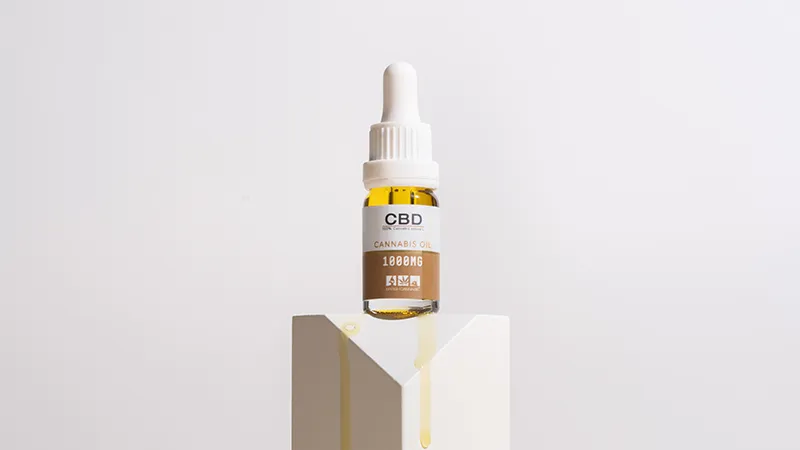

In recent years, the medical landscape has been abuzz with discussions surrounding the potential therapeutic applications of CBD UK oil, particularly in the context of oncology. Prostate cancer, a leading malignancy among men, has become a focal point in this discourse.
Preliminary studies and anecdotal evidence hint at the possible benefits of cannabis oil in managing symptoms and even inhibiting tumor growth. However, the scientific community treads with caution, given the lack of comprehensive human trials that conclusively establish its efficacy.
Can cannabis oil help prostate cancer? While the debate continues, brands like CBD by BC have emerged, offering a range of cannabis oil, emphasizing quality, transparency, and consumer education. This article delves deeper into the current understanding of cannabis oil’s role in prostate cancer management, shedding light on the science, the skepticism, and the stories that fuel this ongoing conversation.
Navigating the world of cannabis can be intricate, given its myriad compounds. However, two cannabinoids stand out due to their prominence and potential therapeutic implications: THC (tetrahydrocannabinol) and CBD (cannabidiol).
THC (Tetrahydrocannabinol)
THC is perhaps the most recognized compound in cannabis, primarily due to its psychoactive properties. When consumed, THC interacts with the brain’s cannabinoid receptors, leading to a range of effects, including euphoria, altered sensory perception, and increased appetite.
These mind-altering properties have made THC the center of many debates, both medical and legal.
CBD (Cannabidiol)
In contrast, CBD offers a different profile. While it is also a major constituent of cannabis, it doesn’t produce the “high” commonly associated with THC. Instead, CBD is non-psychoactive, and its interaction with the body’s endocannabinoid system is more nuanced.
Over the past decade, CBD has garnered significant attention for its potential therapeutic benefits, ranging from pain management to anxiety relief.
Comparing the Two
While both THC and CBD are derived from the cannabis plant, their effects on the human body are distinct. THC’s psychoactive properties can lead to feelings of euphoria and relaxation, but it can also cause side effects like paranoia or impaired memory in some individuals.
CBD, on the other hand, is often lauded for its potential therapeutic effects without the mind-altering consequences. This distinction is crucial, especially when considering cannabis-derived products for medical applications.
The potential of cannabis oil as a treatment for prostate cancer has been a topic of considerable interest and debate. While some studies suggest promising results, the medical community remains divided due to the lack of comprehensive human trials.
To understand the current stance on this issue, it’s essential to first consider the established treatments and then juxtapose them with the findings related to cannabis oil.
Established Treatments for Prostate Cancer
Prostate cancer, one of the most common malignancies in men, has several established treatment modalities:
Cannabinoids and Prostate Cancer: Laboratory and Animal Studies
Recent research has delved into the effects of cannabinoids, primarily THC and CBD, on prostate cancer cells. Some laboratory and animal studies have shown that:
Cannabinoids might inhibit the growth of prostate cancer cells. They could induce apoptosis, a process where cancer cells self-destruct.
Cannabinoids might also impede the angiogenesis process, preventing tumors from building a blood supply.
The Current Medical Stance
Despite these promising findings, there’s a significant gap between laboratory studies and real-world clinical applications. The human body is a complex system, and how cannabinoids interact in a petri dish might differ from their effects in the human body.
Furthermore, the dosages used in laboratory studies often exceed what a human can safely consume. There’s also the challenge of ensuring that cannabinoids specifically target cancer cells without affecting healthy cells.
Given these uncertainties and the potential risks, the medical community remains hesitant to recommend cannabis oil as a primary or even supplementary treatment for prostate cancer. While research is ongoing, and anecdotal evidence suggests benefits, it’s crucial for patients to consult with oncologists and healthcare professionals before considering cannabis oil as a treatment option.

The human body’s interaction with cannabinoids, such as THC and CBD, is mediated through a sophisticated system known as the endocannabinoid system (ECS). Central to this system are the cannabinoid receptors, primarily CB1 and CB2.
Understanding these receptors and their role in cell regulation provides insights into the potential therapeutic applications of cannabinoids in prostate cancer.
CB1 and CB2 Receptors: Gatekeepers of the Endocannabinoid System
CB1 receptors are predominantly found in the brain and central nervous system. They play a pivotal role in regulating mood, appetite, and pain sensation.
Their interaction with THC is what leads to the psychoactive effects commonly associated with cannabis.
CB2 receptors, on the other hand, are more abundant in the peripheral organs, especially immune cells. They play a role in immune system regulation and inflammatory responses.
Cannabinoids and Cell Growth Regulation
Cannabinoids have shown potential in regulating cell growth and inducing cell death in cancerous cells. Some studies suggest that:
Targeting Tumor Cells: A Potential Therapeutic Advantage
One of the most promising aspects of cannabinoids in cancer treatment is their potential specificity. Preliminary studies suggest that cannabinoids might preferentially target tumor cells while sparing healthy cells.
This specificity could offer a significant advantage over traditional chemotherapy, which often affects both cancerous and healthy cells, leading to a range of side effects. In conclusion, while the interaction between cannabinoids and the endocannabinoid system offers promising avenues for prostate cancer treatment, it’s essential to approach these findings with caution.
More comprehensive studies are needed to fully understand the potential benefits and risks.
As the discourse around medical marijuana gains momentum, especially in the context of prostate cancer, it’s paramount to address the associated safety considerations. While the therapeutic potential of cannabis is undeniable, it’s essential to weigh the benefits against the potential risks.
Risks Associated with Medical Marijuana Use
Health Risks of Smoking Marijuana
While many tout the therapeutic benefits of marijuana, smoking remains a contentious method of consumption. The combustion of plant material, irrespective of its source, produces carcinogens. Thus, smoking marijuana can:
Variability in Cannabinoid Content
One of the significant challenges in medical marijuana use is the variability in cannabinoid content across different strains and products. This inconsistency can lead to:
In summary, while the potential therapeutic benefits of medical marijuana, especially in the context of prostate cancer, are promising, it’s essential to approach its use with caution. Patients should always consult with healthcare professionals to ensure they’re making informed decisions that prioritize their safety and well-being.

In the burgeoning market of CBD products, discerning quality and authenticity can be a daunting task. Amidst the myriad of options, CBD by BC emerges as a beacon of trustworthiness and excellence. Here’s why consumers are gravitating towards CBD by BC when considering the purchase of CBD oil.
1. Unwavering Commitment to Quality
CBD by BC is not just another brand in the crowded CBD marketplace. Their unwavering commitment to delivering premium quality products sets them apart. Every batch of CBD oil undergoes rigorous testing to ensure it meets the highest standards of purity and potency.
2. Transparency at its Core
In an industry where misinformation is rife, CBD by BC prioritizes transparency. Every product comes with a detailed Certificate of Analysis, providing consumers with a comprehensive breakdown of cannabinoid content, ensuring they know precisely what they’re consuming.
3. THC-Free Assurance
For those wary of the psychoactive effects of THC, CBD by BC offers peace of mind. Their CBD oil is meticulously processed to ensure it’s THC-free, allowing consumers to reap the potential benefits of CBD without any unwanted psychoactive effects.
4. Value for Money
While quality is paramount, CBD by BC also understands the importance of affordability. Their competitive pricing, coupled with regular promotions and deals, ensures that consumers receive exceptional value for their money.
5. Third-Party Lab Tested
To further bolster consumer trust, CBD by BC’s products are third-party lab tested. This independent verification ensures that the CBD oil adheres to all safety and quality benchmarks, free from any contaminants or adulterants.
6. Educational Resources
CBD by BC is not just about selling products; it’s about empowering consumers. Their platform is replete with educational resources, guiding individuals on their CBD journey, ensuring they make informed decisions tailored to their unique needs.
In a realm where quality can be elusive, CBD by BC stands as a testament to what is achievable when integrity, excellence, and consumer-centricity converge. For those venturing into the world of CBD oil, CBD by BC is a name synonymous with trust.
The intersection of cannabis oil and prostate cancer treatment is a rapidly evolving domain, marked by promising research, anecdotal testimonies, and a fair share of skepticism. As we’ve traversed this landscape, several key points have emerged:
However, as we conclude this exploration, it’s paramount to underscore the importance of individuality. Prostate cancer, like all medical conditions, is deeply personal.
What works for one individual might not work for another. As such, it’s crucial for patients to consult with healthcare professionals, consider their unique medical conditions, and make informed decisions that prioritize their safety and well-being.
Further Reading
For those keen on delving deeper into the multifaceted world of cannabis and its potential therapeutic applications, the following resources offer a wealth of information:
These resources provide a comprehensive look into the current research, debates, and discussions surrounding cannabis, ensuring readers are well-informed and equipped to make educated decisions.
Share with
Sign up to get all the latest news and promo from CBD by BRITISH CANNABIS™ delivered right to you. *Get your FREE CBD GUIDE now to complete your subscription.
CBD by BRITISH CANNABIS™
Overland House, Ashville Way, Wokingham, RG41 2PL, United Kingdom
Copyright BRITISH CANNABIS™ 2025

